Local
Top 10 local news stories for 2023
Hate crimes continue, new queer bars open, and much more
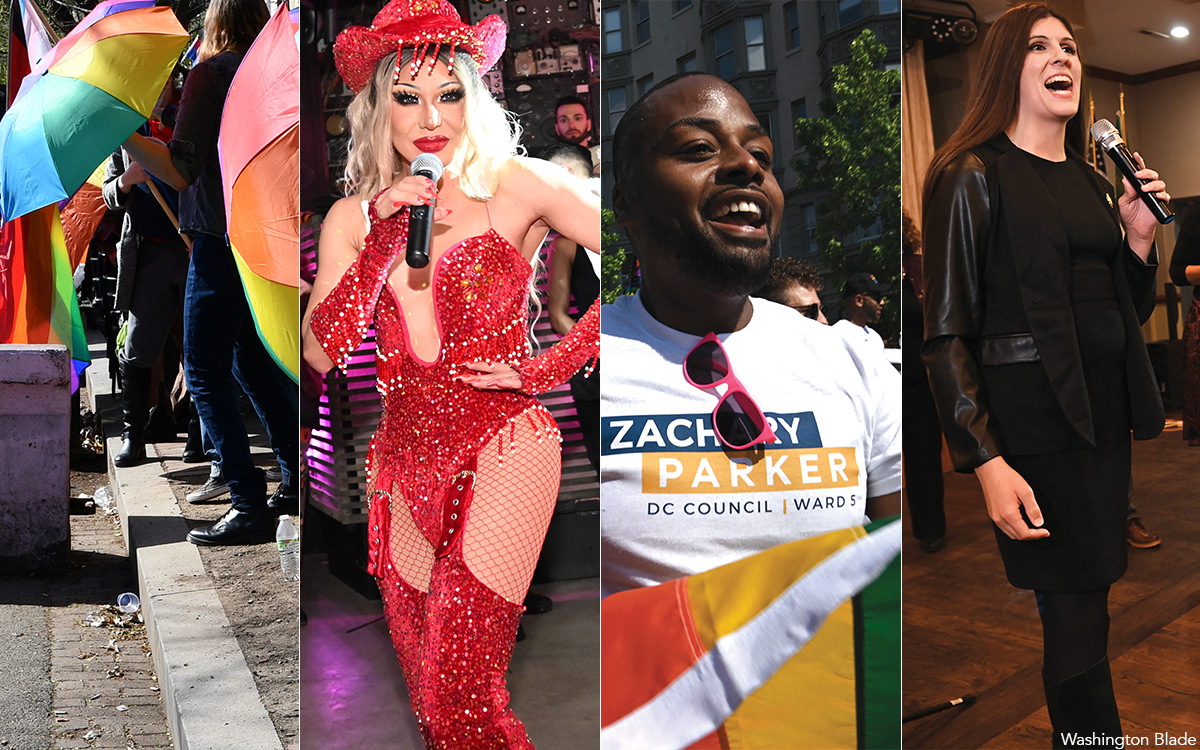
It was another busy year in queer news. Here are the Blade staff picks for the top 10 local news stories of 2023.
#10: Florida prosecutor drops sex with minor charges against Brett Parson
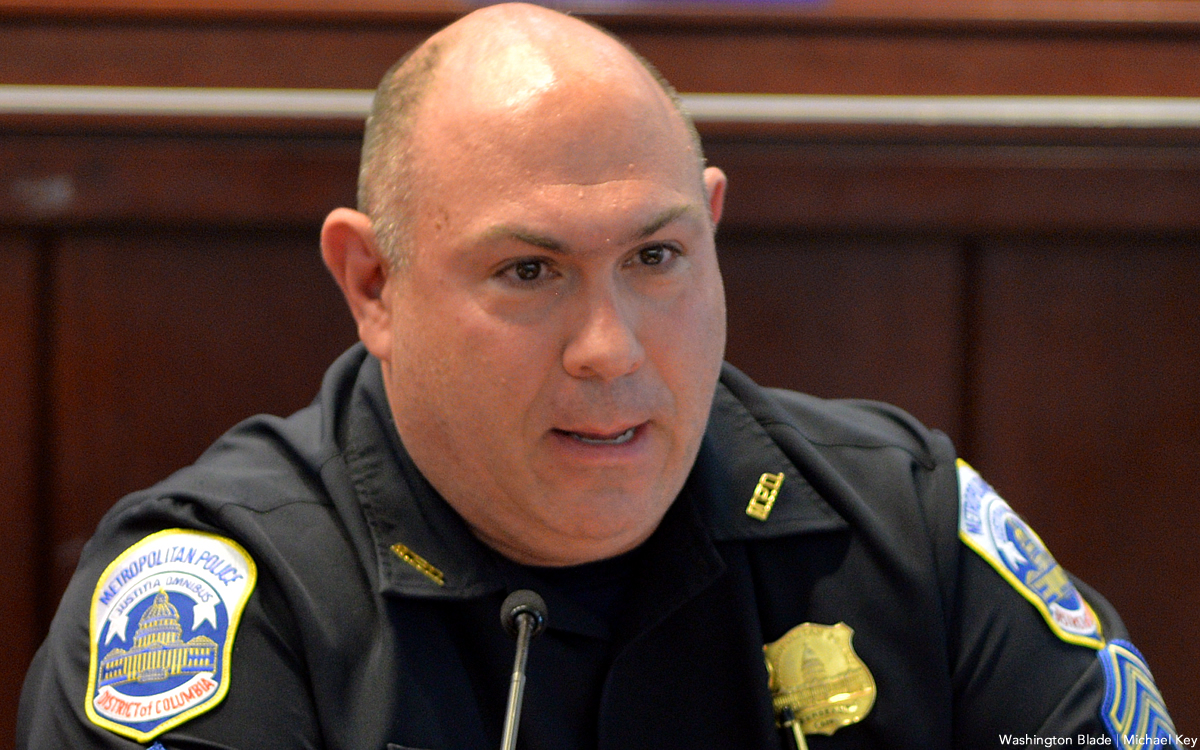
A prosecutor with the Broward County, Fla., State Attorney’s Office on March 13 dropped two charges of unlawful sexual activity with a minor filed against gay former D.C. police lieutenant Brett Parson by Boca Raton, Fla. police in February 2022. Parson’s arrest came shortly after he retired from the police force after 26 years of service, including his role as supervisor of the D.C. police LGBT Liaison Unit.
A memorandum released by the State Attorney’s Office disclosed that prosecutors decided to drop the charges after it became clear that the then 16-year-old boy, who told authorities that his sexual encounter with Parson was consensual, did not want to participate in the prosecution against Parson.
Court records show the youth met Parson after he posted a message on the gay hookup site Growlr and claimed he was 19 years old. The age of sexual consent in Florida is 18, although in several other states, including D.C., the age of consent is 16 and the sexual encounter between Parson and the youth would have been legal in those other states and D.C.
#9: Four new D.C. LGBTQ bars open in 2023
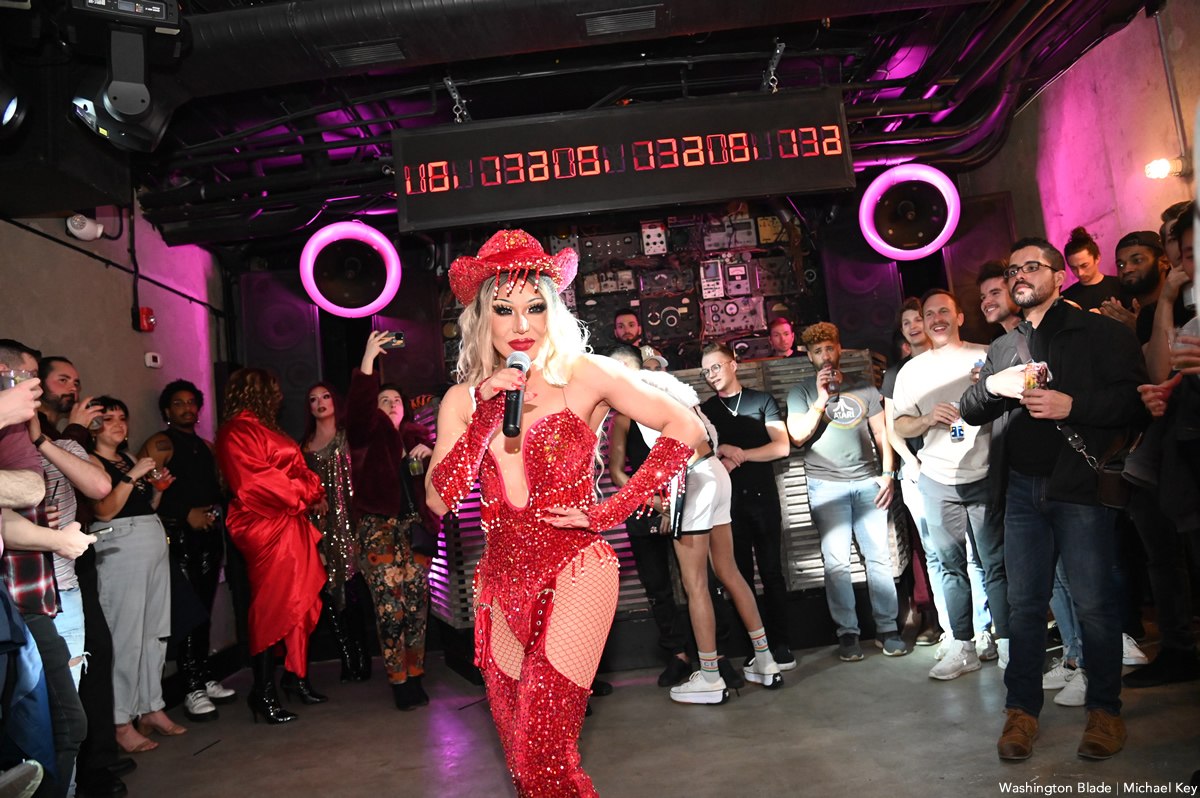
Four new LGBTQ bars opened in D.C. in 2023, bringing the total number of LGBTQ identified bars in the nation’s capital to 19. The first of the four new ones to open was Little Gay Pub at 1100 P St., N.W. near Logan Circle. Its owners and business partners, Dito Sevilla, Dusty Martinez, and Benjamin Gander, have years of experience working at other nearby bars and restaurants, with Martinez and Gander having worked at other gay bars.
The gay nightclub and dance bar Bunker opened a short time later in a large basement space at 2001 14th St., N.W., steps away from the bustling nightlife intersection at 14th and U streets, N.W. Co-owners Zach Renovates and Jesus Quispe for many years produced LGBTQ entertainment events through their company KINETIC Presents. Next to open was Shakers at 2014 9th St., N.W. in the busy 9th and U Street entertainment corridor, which bills itself as a “full spectrum bar, with everything from family nights to ANC meet-and-greets to drag shows.”
And in December Thurst Lounge opened at 2204 14th St., N.W. Owners Brandon Burke and Shaun Mykals describe it as a “space that represents and honors the unique and culturally rich Black gay experience.”
#8: D.C. gov’t holds ‘LGBTQIA Emergency Training’ event
About 25 representatives of local LGBTQ organizations turned out on April 5 for the first in what was expected to be a series of LGBTQIA+ Emergency Preparedness Training sessions offered by the D.C. Homeland Security and Emergency Management Agency and the Mayor’s Office of LGBTQ Affairs.
Japer Bowles, director of the Office of LGBTQ Affairs, said the initial training session was for nonprofit LGBTQ organizations aimed at helping them take steps to minimize potential threats of violence and to recognize behaviors by individuals who may pose a threat. He said among those attending the April 5 training session were representatives of the D.C. Center for the LGBTQ Community, one of the city’s largest local LGBTQ organizations that is about to move into a new, larger space in a building in the city’s Shaw neighborhood.
#7: Proud Boys target local drag queen story hour events
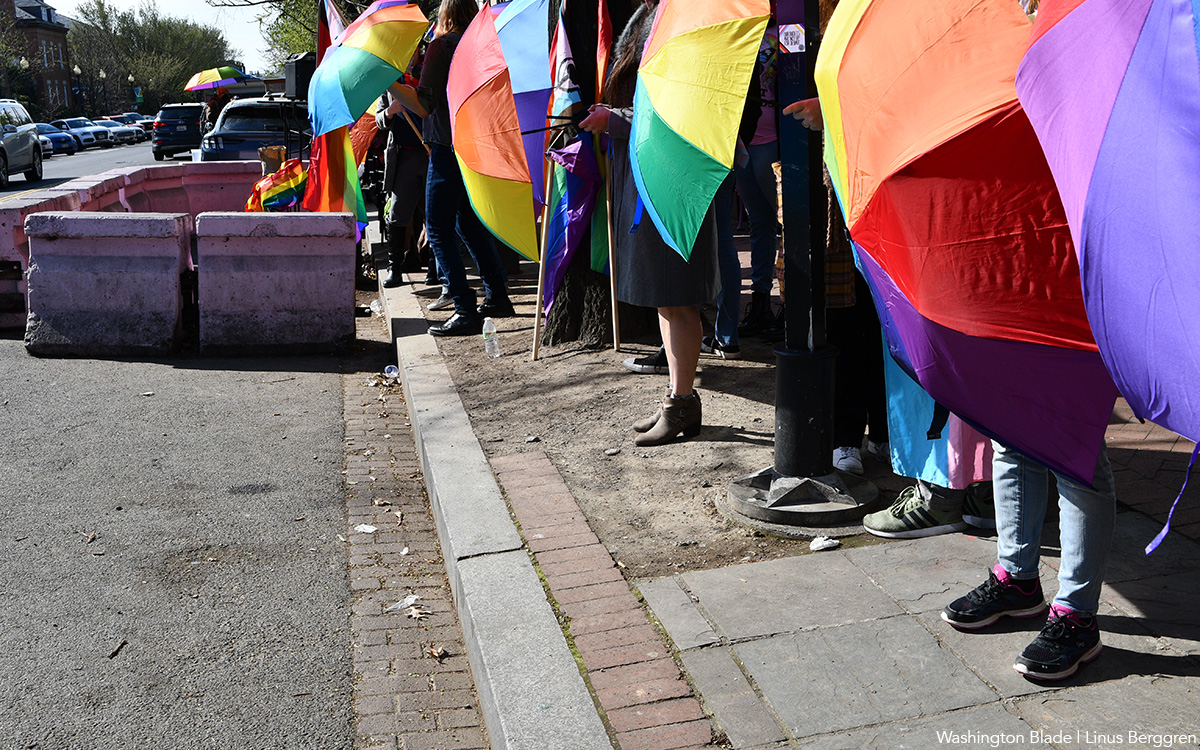
The far-right group Proud Boys targeted bookstores in Silver Spring, Md. and D.C. in February for protests against the reading of children’s stories by drag performers in an event known as Drag Queen Story Hour. But the group only showed up at the Loyalty Bookstore in Silver Spring. Silver Spring police dispersed the Proud Boys members and counter protesters who supported the drag event after the two groups shouted at each other and reports surfaced that a Proud Boy member assaulted one of the supporters.
One week later, after news surfaced that the Proud Boys planned to hold a protest targeting a Drag Story Hour event at the gay-owned Crazy Aunt Hellen’s restaurant in the Barracks Row section of Capitol Hill in D.C., dozens of supporters turned out in anticipation of the Proud Boys protest. D.C. police, who closed the one-block section of 8th Street, S.E. in anticipation of the protest, said the Proud Boys never showed up.
#6: D.C. mourns loss of two community leaders and a beloved bartender
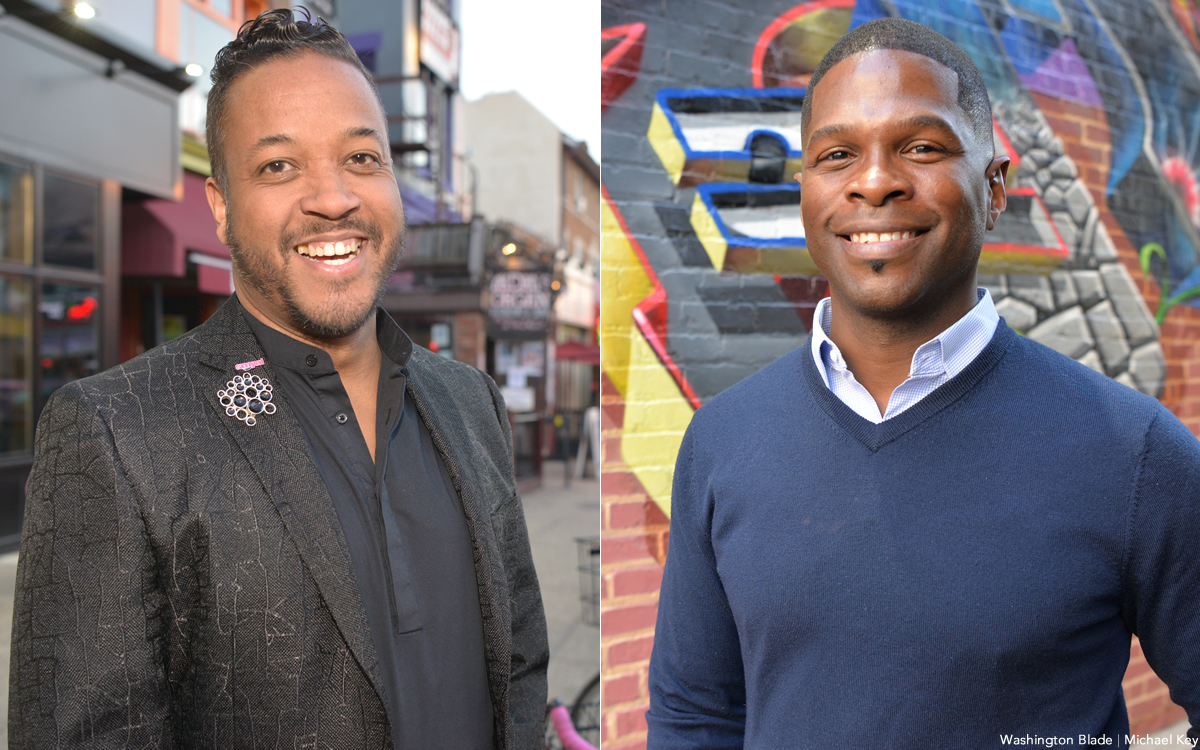
Many in D.C.’s LGBTQ community in July mourned the unexpected deaths of two gay longtime supporters of LGBTQ causes, Jocko Fajardo and Tarik Pierce, and a beloved bartender, Brooks Davis. Fajardo, a skilled chief, florist, and event planner, and Pierce, an official with the U.S. Department of Veterans Affairs, each died in their homes at the age of 45 in D.C. within one week of each other of undisclosed causes. About 300 people turned out in D.C. ‘s Logan Circle for a candlelight vigil in remembrance of the two men.
Also mourned by a large circle of friends in July was gay bartender Brooks Davis, 29, who died on July 17. Family members asked that the cause of death remain private. Davis worked at the D.C. gay nightclub Bunker after having worked for the luxury retail outlet Louis Vuitton and later operated his own exotic plant business before beginning work as a bartender.
#5: Partner says police botched probe into death of Washington Wizards chef
The longtime domestic partner of Ernest Terrell Newkirk, 55, who worked as chef at D.C.’s Capital One Arena for the Washington Wizards basketball team, expressed strong concern that D.C. police failed to adequately investigate Newkirk’s initially unexplained death.
The partner, Roger Turpin, pointed out that Newkirk was found deceased on a residential street in the 1100 block of 46th Place, S.E., shortly after 3 a.m. on May 28, with his wallet, watch, jewelry, and his car all missing. There were no signs of injury on Newkirk’s body, and it took the D.C. medical examiner four months to complete toxicology tests to finally determine the cause of death, which was acute alcohol intoxication.
D.C. police have said they investigated the case. But Turpin says investigators appear to have declined to follow up on information Turpin provided them to track down someone who may have stolen Newkirk’s car, phone, and credit cards. Turpin says he gave police phone numbers that someone used on Newkirk’s stolen phone to make calls that Turpin obtained from the phone records.
#4: Two area trans lawmakers make history
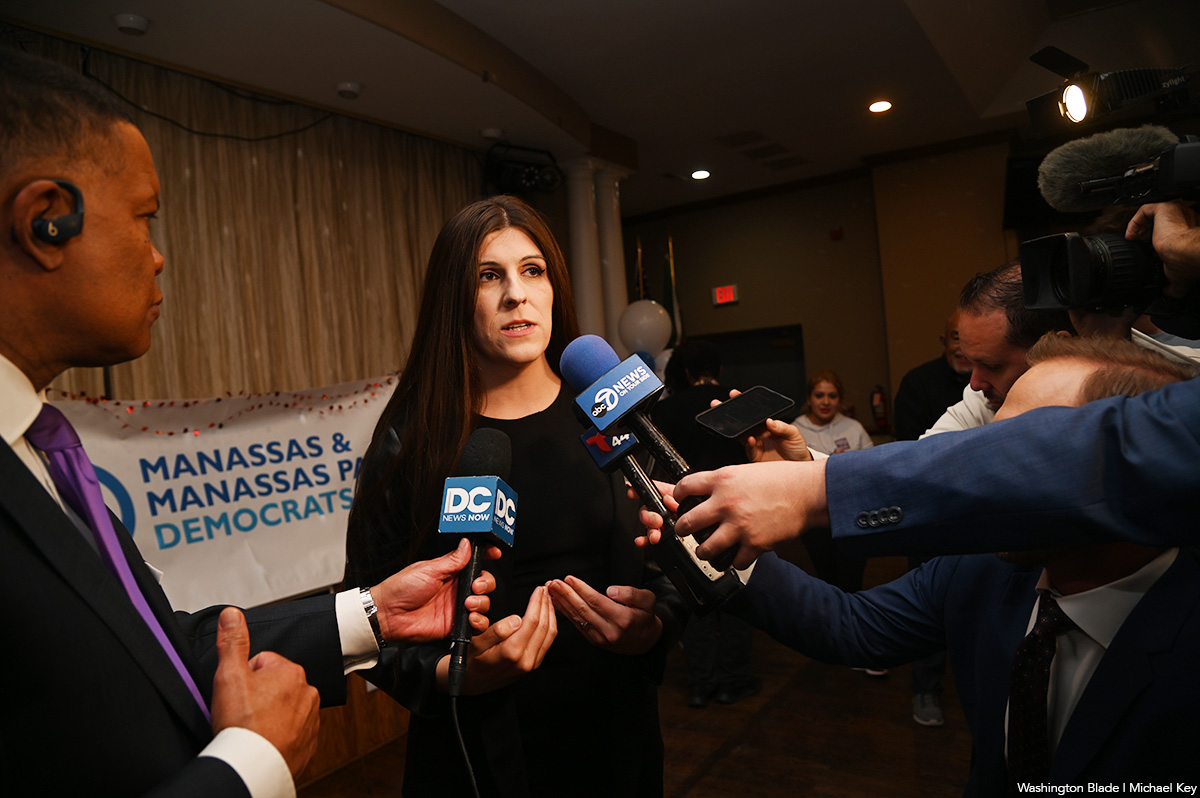
Two transgender elected officials in the greater D.C. region made history in 2023. Virginia state Del. Danica Roem (D-Manassas) won a decisive victory for a seat in the Virginia state Senate in the state’s Nov. 7 election, becoming the second openly transgender person to win election to a state Senate in the country.
And earlier in the year, Delaware state Sen. Sarah McBride, who became the first transgender person to win a seat in a state Senate in 2020, declared her candidacy for the single Delaware seat in the U.S. House of Representatives. Recent polling data show McBride is far ahead of her closest rival in the 2024 Democratic primary. If she wins the primary, as expected, and wins in the November 2024 general election in the solidly Democratic state of Delaware, McBride would become the first transgender person in the U.S. Congress.
#3: Spate of assaults targets LGBT people for possible hate crimes
Two gay bar customers were stabbed in the neck with nonfatal wounds on Aug. 18 outside the Dupont Circle gay bar Fireplace by a woman who D.C. police arrested on a charge of assault with a dangerous weapon and a judge ordered to undergo a mental health examination. That incident followed the arrest by D.C. police in January of three juveniles for four separate armed robberies in the Dupont Circle area near gay bars.
And in August, the Office of the U.S. Attorney for D.C. continued to decline to prosecute two male suspects identified by D.C. police who robbed and pistol whipped a D.C. gay couple in January 2022 after the couple appealed to prosecutors to move ahead with a prosecution. A spokesperson for the U.S. The Attorney’s office said there was insufficient evidence to charge the suspects. Dupont Circle Advisory Neighborhood Commissioner Vincent Slatt, who heads the ANC’s Rainbow Caucus, expressed concern that police were not disclosing sufficient information on whether the growing number of crimes in Dupont Circle and other city neighborhoods are LGBTQ related and whether the assaults against them may be hate crimes.
With this as a backdrop, D.C.’s new police chief, Pamela Smith, told the Blade in an interview she pledges “fair and equal treatment” for the LGBTQ community.
#2: Violence continues against D.C.-area trans women
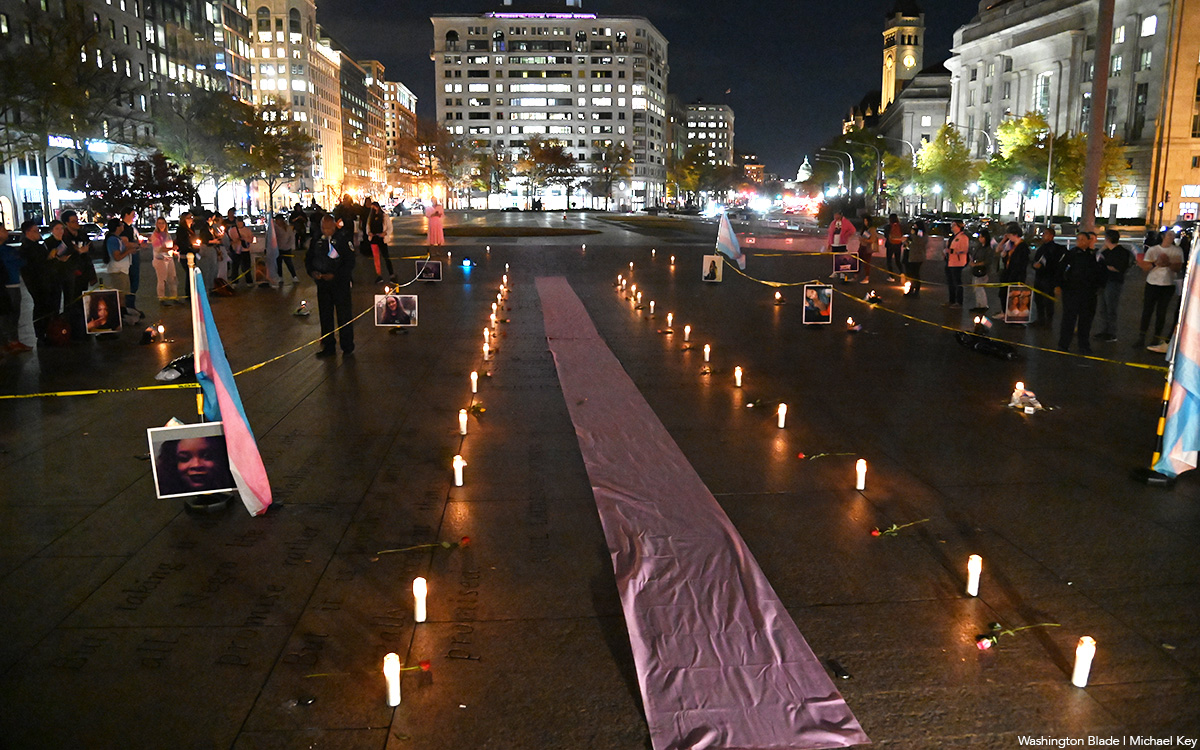
At least three transgender women were murdered in the D.C. region and a fourth was found dead under suspicious circumstances in 2023, prompting transgender activists to continue their ongoing efforts to address what they consider a nationwide epidemic of anti-trans violence.
The first of the incidents took place Jan. 7 when Jasmine “Star” Mack, 36, was found stabbed to death on the 2000 block of Gallaudet St., N.E. D.C. police say they are actively investigating the case. On March 24, Tasiyah Woodland, 18, was shot to death outside the Paradise bar and grill in Lexington Park, Md. With the help of D.C. police, St. Mary’s County police charged D.C. resident Darryl Parks Jr., 29, with first-degree murder and additional gun related charges in connection with the murder. Police said the shooting followed a dispute between Parks and Mack, but Mack’s family members believe it was a hate crime.
On Oct. 2, 30-year-old trans woman Skylar Harrison Reeves’s partially naked body was found on a park bench in D.C.’s Marvin Gaye Park. Police say there were no obvious injuries found and they are waiting for the medical examiner’s office to determine the cause of death upon completion of toxicology tests. Reeves’s aunt says she believes foul play led to the death. And on Oct. 18, D.C. resident A’nee Roberson, 30, was fatally struck by a car on the 900 block of U Street, N.W., after witnesses say she was assaulted by one or more unidentified suspects and chased into the street in the path of an oncoming car. D.C. police have listed the incident as a homicide, saying the person or persons who assaulted her and forced her into the street committed second-degree murder.
#1: Gay College Park Mayor Patrick Wojahn pleads guilty to child porn charges
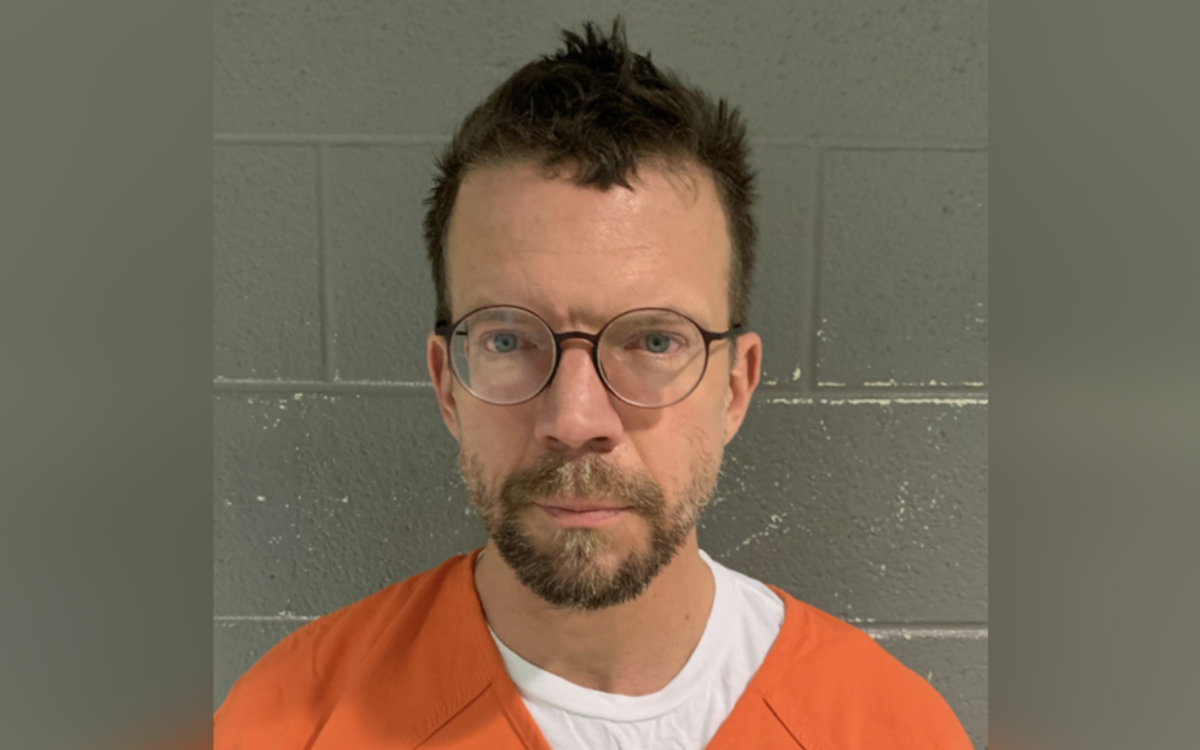
A Prince George’s County Circuit Court judge on Nov. 20 sentenced gay former College Park Mayor Patrick Wojahn to 30 years in jail just over three months after Wojahn pleaded guilty to 140 counts of possession or distribution of child pornography.
The sentencing followed news that surfaced in March, which shocked Wojahn’s friends and longtime political supporters, including LGBTQ activists, that he had been arrested after police raided his College Park house and confiscated multiple devices, including computers and cell phones, containing hundreds of images or videos of child pornography depicting pre-pubescent boys.
At the sentencing hearing over a dozen of Wojahn’s friends and family members, including his husband, urged the judge to consider Wojahn’s own statements saying mental health issues were at play in his actions and that he cooperated with the police investigation and deeply apologized for what he did. Under Maryland sentencing rules, Wojahn will be eligible to apply for release on parole after serving 12 and a half years of incarceration.
Honorable mention: Zachary Parker sworn in as new D.C. Council member
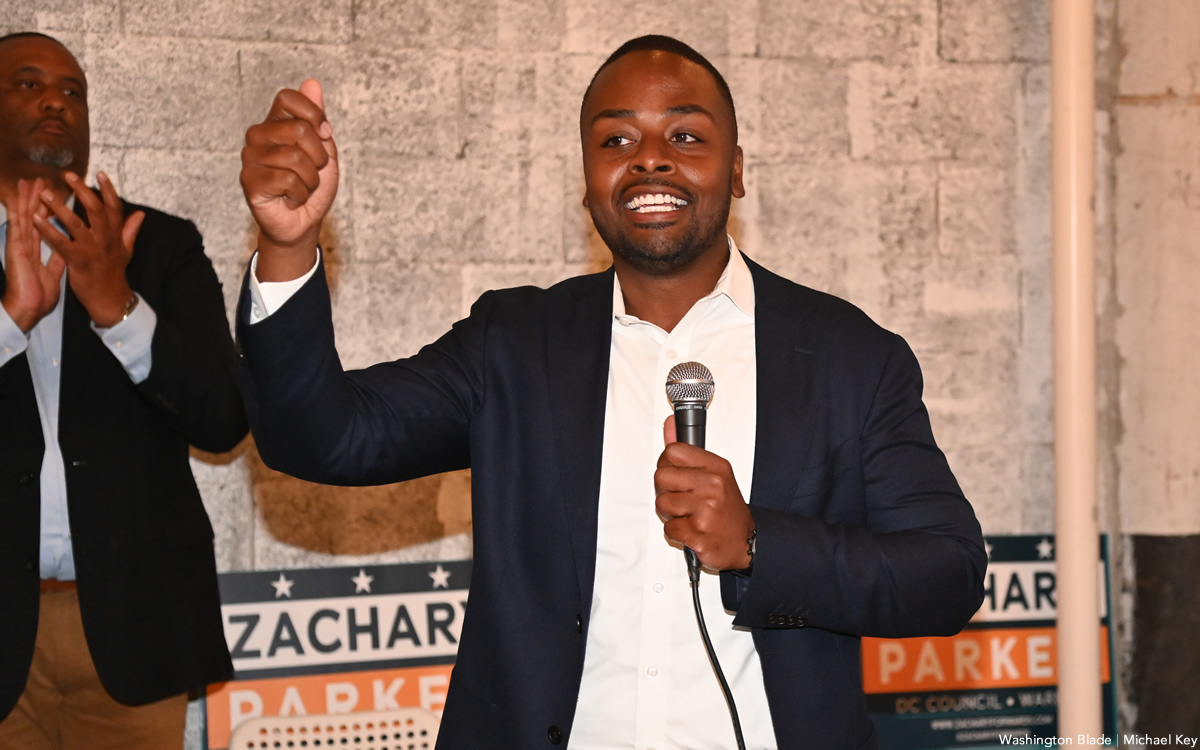
Former D.C. school board member Zachary Parker was sworn in on Jan. 2 as the first openly gay member of the D.C. Council since 2015 at an inaugural ceremony in which other elected officials, including D.C. Mayor Muriel Bowser and six other Council members were also sworn in.
Parker, a Democrat, won election in November 2022 to the Ward 5 Council seat by a wide margin after winning a hotly contested Democratic primary for the Ward 5 seat.
In his inaugural speech after being sworn in as a Council member, Parker said he ran on a vision that “all District residents deserve good and accountable government” and pledged to work to help serve the needs of the city’s diverse residents, including LGBTQ residents.
“With this honor comes the responsibility to address the ridiculously high rates of queer youth homelessness” and “ensure that we’re investing in the people and organizations that are fighting every day for our LGBTQIA plus neighbors,” he said in his speech.
District of Columbia
D.C. Black Pride theme, performers announced at ‘Speakeasy’
Durand Bernarr to headline 2026 programming

The Center for Black Equity held its 2026 DC Black Pride Theme Reveal event at Union Stage on Monday. The evening, a “Speakeasy Happy Hour,” was hosted by Anthony Oakes and featured performances by Lolita Leopard and Keith Angelo. The Center for Black Equity organizes DC Black Pride.
Kenya Hutton, Center for Black Equity president and CEO, spoke following the performances by Leopard and Angelo. Hutton announced this year’s theme for DC Black Pride: “New Black Renaissance.”
Performers for 2026 DC Black Pride were announced to be Bang Garcon, Be Steadwell, Jay Columbus, Bennu Byrd, Rue Pratt and Akeem Woods.
Singer-songwriter Durand Bernarr was announced as the headliner for the 2026 festivities. Bernerr gave brief remarks through a video played on the screen at the stage.
DC Black Pride is scheduled for May 22-25. For more information on DC Black Pride, visit dcblackpride.org.
Virginia
Arlington LGBTQ bar Freddie’s celebrates 25th anniversary
Owner asks public to support D.C.-area gay bars

An overflowing crowd turned out Sunday night, March 1, for the 25th anniversary celebration of Freddie’s Beach Bar, the LGBTQ bar and restaurant located in the Crystal City section of Arlington, Va.
The celebration began as longtime patrons sitting at tables and at the bar ordered drinks, snacks, and full meals as several of Freddie’s well-known drag queens performed on a decorated stage.
Roland Watkins, an official with Equality NoVa, an LGBTQ advocacy organization based in the Northern Virginia areas of Arlington, Alexandria, and Fairfax County, next told the gathering about the history of Freddie’s Beach Bar and the role he said that owner Freddie Lutz has played in broadening the bar’s role into a community gathering place.
“Twenty-five years ago, opening a gay bar in Arlington was not a given,” Watkins told the crowd from the stage. “It took courage, convincing, and a deep belief that our community belongs openly, visibly, and proudly,” he said. “And that belief came from Freddie.”
Watkins and others familiar with Freddie’s noted that under Lutz’s leadership and support from his staff, Freddie’s provided support and a gathering place for LGBTQ organizations and a place where Virginia elected officials, and candidates running for public office, came to express their support for the LGBTQ community.
“Over the past 25 years, Freddie’s has become more than a bar,” Watkins said. “It has become a community maker.”
Lutz, who spoke next, said he was moved by the outpouring of support from long-time customers. “Thank you all so much for coming tonight and thank you all so much for your support over the past 25 years,” he said. “I can’t tell you how much that means to me and how much it’s kept me going.”
But Lutz then said Freddie’s, like many other D.C. area gay bars, continues to face economic hard times that he said began during the COVID pandemic. He noted that fewer customers are coming to Freddie’s in recent years, with a significant drop in patronage for his once lucrative weekend buffet brunches.
“So, I don’t want to be the daddy downer on my 25-year anniversary,” he said. “But this was actually the worst year we’ve ever had,” he added. “And I guess what I’m asking is please help us out. Not just me, but all the gay bars in the area.” He added, “I’m reaching out and I’m appealing to you not to forget the gay bars.”
Lutz received loud, prolonged applause, with many customers hugging him as he walked off the stage.

In an official statement released at the reveal event Capital Pride Alliance described its just announced 2026 Pride theme of “Exist, Resist, Have the Audacity” as a “bold declaration affirming the presence, resilience, and courage of LGBTQ+ people around the world.”
The statement adds, “Grounded in the undeniable truth that our existence is not up for debate, this year’s theme calls on the community to live loudly and proudly, stand firm against injustice and erasure, and embody the collective strength that has always defined the LGBTQ+ community.”
In a reference to the impact of the hostile political climate, the statement says, “In a time when LGBTQ+ rights and history continue to face challenges, especially in our Nation’s Capital, where policy and public discourse shape the future of our country, together, we must ensure that our voices are visible, heard, and unapologetically centered.”
The statement also quotes Capital Pride Alliance CEO and President Ryan Bos’s message at the Reveal event: “This year’s theme is both a declaration and a demand,” Bos said. “Exist, Resist, Have Audacity! reflects the resilience of our community and our responsibility to protect the progress we’ve made. As we look toward our nation’s 250th anniversary, we affirm that LGBTQ+ people have always been and always will be part of the United States’s history, and we will continue shaping its future with strength and resolve,” he concluded.
-

 India5 days ago
India5 days agoActivists push for better counting of transgender Indians in 2026 Census
-

 Advice5 days ago
Advice5 days agoDry January has isolated me from my friends
-

 District of Columbia5 days ago
District of Columbia5 days agoCapital Pride reveals 2026 theme
-

 National4 days ago
National4 days agoAfter layoffs at Advocate, parent company acquires ‘Them’ from Conde Nast


















